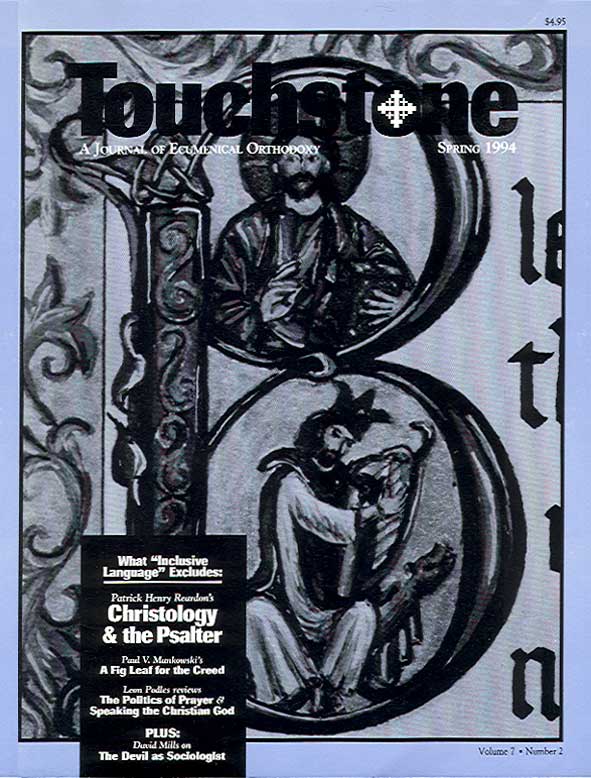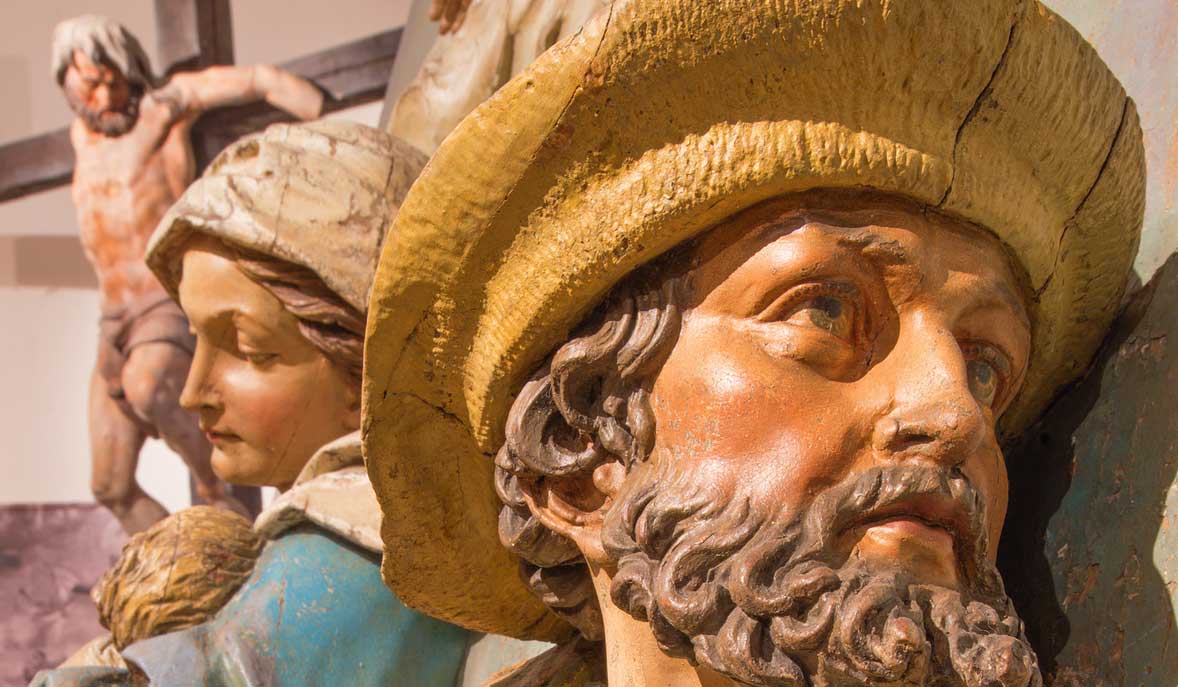The Devil Is a Good Sociologist
While a tall, thin, almost gaunt young man with a close-cropped beard and mystic expression strummed his guitar and sang “How Great Thou Art,” a pretty young woman in a thin white leotard and short blue skirt swirled around in front of the altar. Such was the meditation, as it was called, at the closing service of the Gospel and Our Culture Network’s annual meeting in mid-February.
The Gospel and Our Culture Network (GOCN) originated in England among people stimulated by the books of Bishop Lesslie Newbigin, who has written quite helpfully on the Church’s relation to an increasingly secular Western culture in books like The Gospel in a Pluralist Society. The American branch, which is independent of the English, was formed a few years ago. The membership mostly is Reformed and Presbyterian, with a few Mennonites and non-denominational Christians, and a smattering of Episcopalians, Lutherans, and so on.
Its published writings have been uniformly good, which made the meeting’s worship so surprising. Because of the worship, I had to conclude to my disappointment that what had seemed an important movement to analyze and engage Western culture had conceded too much to “our culture” and was thus far too vague about “the Gospel.”
The Worship
The Network’s worship disturbed me so greatly because a people’s worship and prayer express their real beliefs more deeply and accurately than statements and articles. It is when someone talks to you in the kitchen that you know what he thinks and feels about you, not when he stands at a lectern reading from a prepared text. So in worship, when we come to talk intimately with God. Whether Baptist or Roman Catholic, the “ecumenically orthodox” would have found the worship at the five services deeply troublesome.
And it was not, I should say, a worship imposed on the meeting and therefore of little significance. At the end, the director of the GOCN commended the worship leaders to appreciative applause, and no one I spoke with––except the English observers, who seemed quite disturbed––found it at all problematic. The most critical remark I heard was that it was a bit trendy, but the leaders meant well. The “working group” or small group discussions indicated that the worship expressed what most of the leaders and articulate members really thought.
In the worship, except for one recitation of the Lord’s Prayer and a few classic hymns, God was never addressed as “Father” or referred to as “he.” Jesus, on the relatively infrequent occasions he was mentioned, was never “the Son” and his status in the divine economy was never made clear. Except for the Lord’s Prayer and the classic hymns, I do not think anything was said in worship that could not be said enthusiastically by a Unitarian, and little that could not be said by a Hindu.
The only explicit doctrinal confession was a “Statement of Faith” said at the opening service and not repeated thereafter. It went, in its entirety:
We are the people of God.
We are a sign of the new world.
We are the sisters and brothers of Jesus.We believe in God. We believe in the Goodness of God, the presence of God in human history, and the nearness of God’s love.
We believe that the world can change, that peace and wholeness can come, and that the New World can arrive.We are the people of God.
We are the sign of the New World.
We are the brothers and sisters of Jesus.
Significantly, I think, this “Statement of Faith”––unitarian, pelagian, utopian, self-congratulatory, and sentimental as it is––was preferred to the Apostles’ Creed, the obvious choice for an ecumenical confession.
Like the creed, the confession was said only once, avoided calling God Father, and was not at all clear why we needed him. “Caring and compassionate Creator,” it began,
we enter this place set apart for your worship, knowing that we have failed to see you in other places. We have ignored your beauty around us, in earth and sky, in plants and creatures, in the people who surround us. We have chosen to live more by our fears than by our faith, to be weighted down by what we do not have, rather than rejoicing in your gifts to us. In these moments together, draw us so close that we cannot help but know everyday that you are with us, wherever we go. Enlarge our capacity to serve, so we may see you in all whom we meet. In Jesus’ name. Amen.
This is regretful rather than repentant; our offenses, if such they may be called, are pitiable failures to be all we can be rather than willful acts of disobedience to God. The image it brings to mind is the shy, bespectacled little boy who just has to be encouraged by a warm voice and soft hug to step up to the plate and swing for the fences, not (as seems to be the case) wild screeching children covered with filth and flinging filth on everyone within reach.
In all this, it was very hard to find “the Gospel” but very easy to find “our culture,” particularly the culture of affluent white upper-middle-class academia: in the fear of “sexist” and “exclusive” language like “Father,” and I think also of the authority that Name conveys; in the absence of a recognition of sin and death; in its optimistic view of our abilities and ends; in its doctrinal imprecision and carelessness; in its utopian belief that we can create a new world; in its vague promise of a community without cost or requirements; and in its implicit assumption that the Christian heritage really does not matter, indeed may be a hindrance to “the Gospel.”
And this suggests the real problem with the worship and perhaps even the Network itself: its lack of historical roots or moorings, and its insouciant disregard for tradition. It was not just the invented worship and the rejection of such ancient statements as the Apostles’ Creed; in the discussions one heard the name of the sociologist Robert Bellah more often than all the great minds of the past combined, and inherited forms were (in my hearing at least) always described as hindrances to “the Gospel.”
The members of the network might respond that all cultures distort the Gospel, and that the loveliest Orthodox liturgy or Anglican Morning Prayer may well be as culturally captive as I believe their services were, and they might be right. But the “ecumenically orthodox” do not make claims for the forms in and of themselves. We simply claim that we are partly (but only partly) protected from cultural captivity in a way, judging from its worship, the GOCN has decided not to be. Simply and crudely put: we look to the vast weight of inherited wisdom, and they don’t––and that can make a great deal of difference.
Cultures come and cultures go, and even the most suspicious student of his culture is a product of that culture, blind to some of its greatest faults. The wise Christian will look to the Tradition, and particularly to that which Christians have together held across many times and cultures, to keep himself from being seduced by his own culture. As he descends into the dark cave of contemporary culture, the wise explorer will stay tied by a thick, strong line to the place from whence he came, which is lit by a long accumulated stock of candles and torches and lamps.
The Beam in Our Eye
But we are only partly protected by a conscious deference to the Tradition, in part, perhaps, because we confuse traditional forms with the Tradition itself. Though unlikely to be so clumsily or thoughtlessly trendy, Touchstone editors and readers have a beam in our own eye.
As one of the documents passed out at the meeting said, “Church life has easily assumed the character of a voluntary society for the nurture of private belief and value choices, or of a consumer-oriented vendor of religious services and goods.” This is not an insight often advanced by cultural conservatives, except to attack liberals whose cultural captivity is so obvious. (My own Church’s Bishop John Spong, for example, thinks himself a prophet, yet spouts all the platitudes to be heard from nine out of ten people in Cambridge, Massachusetts.)
Conservative Christians have not often realized the extent to which the culture has determined what they believe and how they practice their faith, that much of what they consider “the Gospel” is actually “their culture.” When they could no longer identify the two, their answer to the culture’s challenge has been to retreat, usually into an ecclesiastical ghetto of those who like the same cultural forms and find a sense of superiority in defending them against the infidels outside.
I remember reading once the declaration of a bishop of a “Continuing Anglican” Church that he had left the Episcopal Church because it preached the social Gospel and not the pure Gospel. I knew what he meant, of course, but he and his Church themselves unconsciously preached a social Gospel, only theirs was the social Gospel of 1950s Americanism rather than the 1960s radicalism favored by the Episcopal establishment. From the perspective of one born at the end of the 1950s, bishops marching by the White House to protest American foreign policy does not seem noticeably worse than liturgical processions led by American flags, and may in fact be better.
More subtly, those of us who prefer more traditional worship actually may be treating the Church as a “vendor of religious services and goods,” and preferring our own enjoyment of certain aesthetic forms––Elizabethan English, say––to the souls of the people we are called to reach. When the local vendor stops selling the product, we find another vendor or change products entirely, or even stop buying. I have talked to many people who left the Episcopal Church because they couldn’t tolerate its liberalism anymore, but did not go to Rome or Orthodoxy or Evangelicalism, but stopped going anywhere.
Even compared with the hopelessly trendy worship of the GOCN meeting, we cannot be too smug about our own ability to transcend the prejudices and self-interest of our culture and preach “the Gospel.” The Devil is a good sociologist who knows how to trick Christians into mistaking cultural forms––old or new, he doesn’t care which––for the Gospel.
Though I think the worship troubling, much of the written work of the Gospel and Our Culture Network is very thoughtful. For more information, write: GOCN, Western Theological Seminary, 101 E. 13th Street, Holland, MI 49423-3622.
—David Mills
David Mills has been editor of Touchstone and executive editor of First Things.
bulk subscriptions
Order Touchstone subscriptions in bulk and save $10 per sub! Each subscription includes 6 issues of Touchstone plus full online access to touchstonemag.com—including archives, videos, and pdf downloads of recent issues for only $29.95 each! Great for churches or study groups.
Transactions will be processed on a secure server.
more from the online archives
calling all readers
Please Donate
"There are magazines worth reading but few worth saving . . . Touchstone is just such a magazine."
—Alice von Hildebrand
"Here we do not concede one square millimeter of territory to falsehood, folly, contemporary sentimentality, or fashion. We speak the truth, and let God be our judge. . . . Touchstone is the one committedly Christian conservative journal."
—Anthony Esolen, Touchstone senior editor










